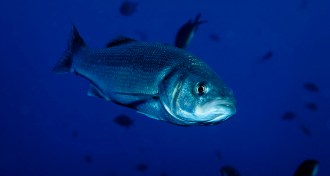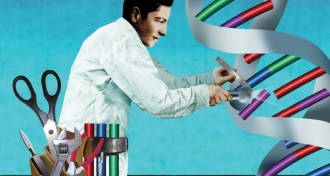Feature
-
 Materials Science
Materials ScienceQian Chen makes matter come alive
Materials scientist Qian Chen is coaxing nanomaterials to self-assemble in new and unexpected ways.
By Meghan Rosen -
 Humans
HumansLawrence David’s gut check gets personal
Computational biologist Lawrence David regularly opens himself to new scientific challenges, including tracking his own microbiome.
-
 Astronomy
AstronomyAnna Frebel digs a young universe
Astronomer Anna Frebel has discovered record-breaking stars, including the most pristine in the galaxy.
-
 Neuroscience
NeuroscienceJeremy Freeman seeks to simplify complex brain science
As a group leader at the Janelia Research Campus, Jeremy Freeman is equal parts neuroscientist, computer coder and data visualization whiz.
-
 Computing
ComputingShayan Oveis Gharan finds the shortest route to success
Theoretical computer scientist Shayan Oveis Gharan has identified connections between unrelated fields to tackle the traveling salesman problem.
-
 Oceans
OceansMelissa Omand’s clever tech follows the fate of ocean carbon
Drawn to the water early, oceanographer Melissa Omand now leads research cruises studying how carbon and nutrients move through the seas.
-
 Physics
PhysicsTenio Popmintchev fits X-ray laser on a tabletop
Laser physicist Tenio Popmintchev has created a Swiss-army-knife tool made of light.
-
 Oceans
OceansFish escapes from marine farms raise concerns about wildlife
Farmed salmon, sea bass and other fish frequently escape from sea cages into the ocean. Will these runaways harm native wildlife?
By Roberta Kwok -
 Microbes
MicrobesMicrobial matter comes out of the dark
Undiscovered bacteria challenge what scientists know about microbial life.
By Laura Beil -
 Life
LifeCRISPR inspires new tricks to edit genes
CRISPR/Cas9 has been a rockstar gene-editing tool for just four years and it’s already being tweaked to do more things better.
-
 Neuroscience
NeuroscienceWhat Donkey Kong can tell us about how to study the brain
Neuroscience tools failed to reveal much about a simple microprocessor. What can they really tell us about the brain?
-
 Physics
PhysicsThe pressure is on to make metallic hydrogen
Scientists are getting close to turning hydrogen into a metal — both in liquid form and maybe even solid form. The rewards, if they pull it off, are worth the effort.